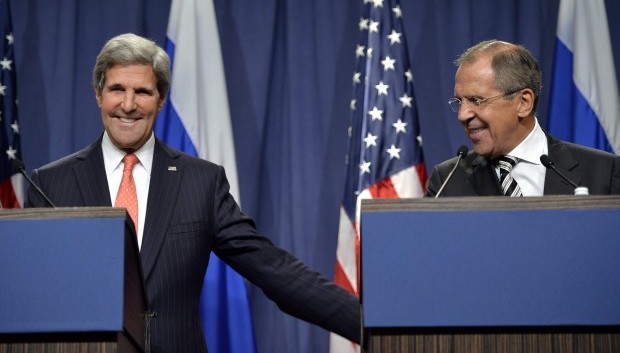The Americans and the Russians have agreed to destroy the Assad regime’s arsenal of chemical weapons after three days of negotiations in Geneva. The agreement could be described as akin to buying fish in the sea, and it is difficult to believe it would succeed, or that it would be taken seriously by Assad.
I say this agreement is like buying fish in the sea for a number of reasons. The first is because US secretary of state John Kerry says that according to the agreement, Assad must provide a complete list of his stockpile of chemical weapons within a week, and that inspectors would be on the ground no later than November. Kerry says that the aim is to completely destroy Assad’s chemical weapons by mid-2014, which is the date of the presidential elections in Syria, in which Assad has announced he intends to run.
Kerry then adds—and this is important—that if Assad does not comply with the agreement, his regime will face punishment under Article VII of the United Nations Charter, which means sanctions and military action could be used. However, Russian foreign minister Sergey Lavrov said very clearly that the agreement “did not mention anything about the use of force or automatic sanctions.”
Therefore, the question is: What does the agreement guarantee? And what are the repercussions of non-compliance?
What is more dangerous is that Lavrov says the agreement’s success requires cooperation from the opposition. So, is it the opposition that possesses chemical weapons, or even controls the areas where these weapons are kept?
What is even more dangerous is that the Americans and the Russians have not reached a clear agreement on the number of chemical weapons storage facilities. The reason is clear: if Russia declared the numbers of chemical weapons stockpiles and their sites, this would automatically attribute responsibility for the chemical massacre on August 21 in Eastern Gouta to Assad. That would make it easier to take him to the International Criminal Court should the international community decide to–especially after the secretary-general of the UN said Assad had committed crimes against humanity throughout the revolution—which the Russians want to avoid.
Since there are no clear repercussions for non-compliance by Assad, especially with the failure to agree clearly on the use of force under Chapter VII, and since the agreement was left to Assad’s good intentions with Russia as the sponsor, Moscow has become Assad’s legal guardian.
And since the deadline announced by the US secretary of state for destroying the chemical weapons is mid-2014, the same date as the Syrian presidential elections, Assad can now use them as bargaining tool.
All this means we face an agreement that is difficult to enforce. It is akin to buying fish in the sea, an agreement through which the Russians have yet again succeeded in protecting Assad.
The irony here is that they protected him not by the use of the veto at the Security Council, but with the agreement of the Obama Administration itself.
